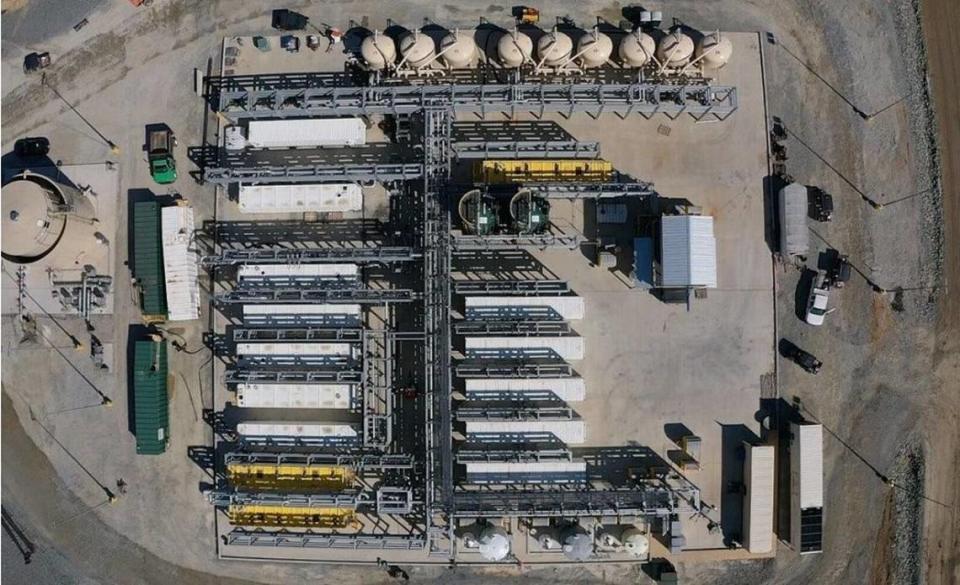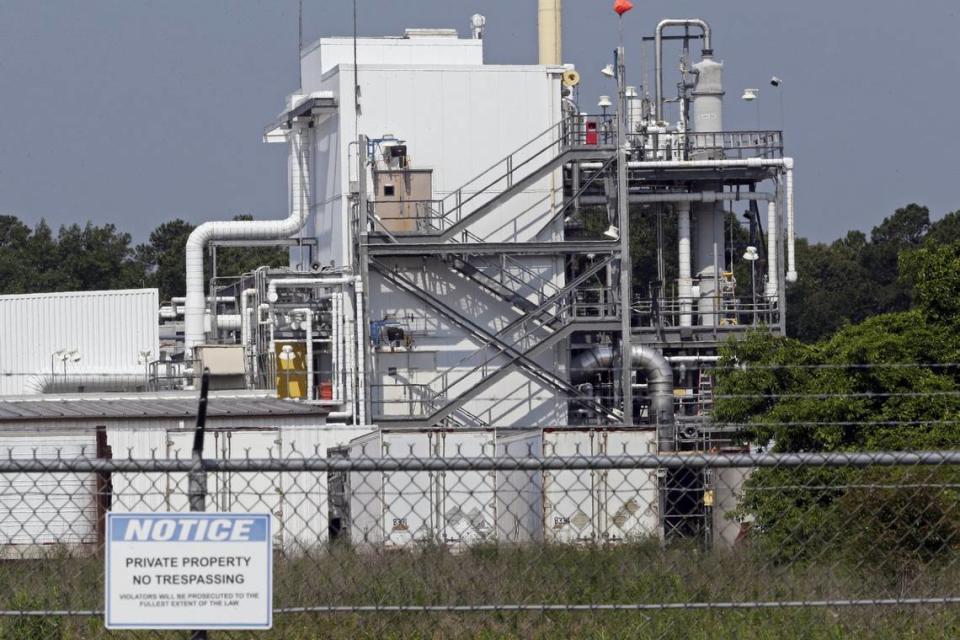UN officials accuse Chemours, DuPont, regulators of human rights violations over PFAS
United Nations-appointed experts have alleged that Chemours and other companies linked with the Fayetteville Works plant likely violated the human rights of hundreds of thousands of people in Southeastern North Carolina by contaminating drinking water with forever chemicals.
The United Nationals officials, known as rapporteurs, criticized the use of per- and polyfluoroalykl substances like GenX in letters to Chemours, Corteva and DuPont de Nemours. Additionally, the officials sent letters to governments of the Netherlands and the United States, accusing regulators of failing to protect human health and the environment.
“We are especially concerned about DuPont and Chemours’ apparent disregard for the wellbeing of community members, who have been denied access to clean and safe water for decades. This is particularly apparent by their purposeful suppression and concealment of information on the toxic character of PFAS,” said the letters, which were signed by five UN rapporteurs.
The letters, sent in September, were published late last week along with responses from Chemours, Corteva and the Netherlands. DuPont de Nemours sent a response Monday, saying Corteva now owns E.I. du Pont de Nemours and Company, the entity that owned Fayetteville Works until Chemours was created in 2015.
The U.S. government has not responded.
The communications stem from a complaint filed with the United Nations in April by grassroots organization Clean Cape Fear and the U.C. Berkeley Environmental Law Clinic, alleging that decades of releases of so-called forever chemicals from the Chemours-owned Fayetteville Works plant constitute a human rights abuse.
The rapporteurs do not have legal authority to halt alleged human rights abuses, but they are able to ask questions about and shine a spotlight on those activities under the United Nations banner.
“We are grateful to see the United Nations take action on behalf of Clean Cape Fear and all residents in our region suffering from decades of human rights abuse related to our PFAS contamination crisis. Clearly, the UN recognizes international law is being violated in the United States,” Emily Donovan, a co-founder of Clean Cape Fear, said in a statement.
Donovan criticized the lack of response from DuPont and the U.S. government. Recipients of the rapporteurs’ letters had 60 days to respond before the communications were made public.
Outside of the broader issues of contamination and the decades-long failure to disclose the release of chemicals into drinking water, the UN experts raised questions about Chemours’ plans to expand its operations at Fayetteville Works and the recent approval to ship GenX from a plant in the Netherlands to the North Carolina facility for recycling.
Since 2017, North Carolina and federal regulators have grappled with revelations that Chemours and its predecessor DuPont dumped large quantities of per- and polyfluoroalkyl substances, also known as PFAS, into the Cape Fear River and sent them into the air around the plant. A growing body of scientific evidence has shown that the chemicals are harmful to human health, and standard drinking water treatment technology cannot remove them.
The U.S. Environmental Protection Agency has proposed a health advisory level of 10 parts per trillion for GenX, a level Chemours contends is overly protective. Chemours says GenX does not accumulate like earlier PFAS chemicals and quickly moves through people’s bodies.
“We are also concerned about DuPont and Chemours’ failure to fully assume responsibility and adequately address the negative impacts of their activities on the communities of the lower Cape Fear River watershed. We remain preoccupied that these actions infringe on community members’ right to life, right to health, right to a healthy, clean and sustainable environment, and the right to clean water, among others,” the UN officials wrote.
After the public learned of the contamination in 2017, a Chemours official told Wilmington-area officials the production line resulting in GenX discharges had been in operation since 1980. GenX was an unintended byproduct of that vinyl ethers manufacturing line, the official said at the time.
In its response, Chemours detailed a series of measures it has taken since 2017 to control GenX and other PFAS chemicals. The company noted that it has spent more than $100 million installing a thermal oxidizer that captures and incinerates PFAS chemicals in air emissions and $100 million more building a wall and a system to capture and treat contaminated groundwater around the facility.
“Although Chemours is not aware of any epidemiological studies showing health impacts from exposures to (GenX) or other PFAS originating from Fayetteville Works, Chemours has taken a broad and unprecedented set of actions, consisting hundreds of millions of dollars, to eliminate almost all PFAS discharges from Fayetteville Works,” the company wrote in its response.
Those steps have often been compelled by regulatory or legal action. In November 2017, for example, the N.C. Department of Environmental Quality pulled the company’s permit to discharge into the Cape Fear River. And a 2019 consent order with DEQ and Cape Fear River Watch has resulted in alternative water supplies for more than 7,300 homes where well water contains PFAS.
Chemours was spun off from DuPont as part of a 2015 restructuring that occurred amid mounting legal concerns related to PFAS compounds PFOA and PFOS.
DuPont developed HFPO Dimer Acid and its ammonium salt, commonly referred to as GenX, to replace PFOA as its risks became increasingly clear. Chemours continued to manufacture GenX at Fayetteville Works after the corporate restructuring.
GenX was never discharged from the area where it was made at Fayetteville Works, Chemours officials wrote, but instead reached the Cape Fear River through separate manufacturing areas where it was an unintended byproduct.
“Chemours was already evaluating alternatives for additional equipment to abate PFAS discharges when the presence of PFAS in the Cape Fear River became a major public concern in June 2017,” the Chemours letter says.
Donovan pointed specifically to that part of Chemours’ response.
“The one thing Chemours’ letter does finally make public is that the company knew about, tried internally to address, and actively suppressed information about its PFAS pollution problem well before the public learned of it independently in 2017,” Donovan wrote. “This is morally outrageous.”
Donovan also criticized the scope of Chemours’ response to the UN, noting that it focuses on GenX rather than the dozens of other PFAS that have been linked with Fayetteville Works. And, Donovan wrote, Chemours failed to address downstream residents whose drinking water comes from the Cape Fear River who are not eligible for drinking water treatment technology under the consent order,
“These residents have not been provided alternative water supplies (i.e. bottled water or water delivery vouchers) while they wait on their public water systems to install critical and costly filtration upgrades,” Donovan wrote.
Recycling GenX at Fayetteville Works
The UN officials’ letter to the Netherlands focused on Chemours’ shipments of GenX-laden wastewater from the company’s Dordrecht plant to Fayetteville Works. NC Newsline recently reported that the EPA in September authorized Chemours to ship up to 4 million pounds of wastewater.
“We are concerned about the role the Netherlands might be playing in PFAS pollution in North Carolina by exporting GenX waste to the Fayetteville facility,” the UN officials wrote.
After outcry from members of the public and elected officials, the EPA asked Chemours to pause the shipments so regulators could conduct further review. The Fayetteville Works facility had not yet received any new shipments.
In its response, the Netherlands government argued that shipments of wastewater containing GenX are legal. The European Union’s Waste Shipment Regulation requires an agency from the country originating the shipment to review the proposal and seek consent from the country where the waste is being sent.
Regulators followed that process, the Netherlands wrote, in which the EPA said the waste would be recovered “in an environmentally sound manner” at Fayetteville Works.
Chemours’ response says the GenX chemicals are used to produce fluoropolymers at the Dordrecht plant. Wastewater containing GenX is captured and and sent to the North Carolina plant, where it is “purified” before being sent back to the Netherlands for use.
“Rather than having to manufacture all (GenX) entirely from virgin materials, Chemours is able to utilize a substantial amount of recycled material, reducing environmental impacts from production and disposal in both Europe and the United States,” Chemours officials wrote.
But the Netherlands response has advocates questioning the legality of the shipments.
Netherlands officials wrote that EU law only “allows exports intended for recovery and prohibits exports intended for disposal” to countries that have not ratified the Basel Convention. The United States is one of five UN members that is not party to the 1990s-era treaty, which is meant to decrease transnational shipment of waste and increase notification of shipments that do occur.
Bloomberg News has previously reported, and Chemours has confirmed, that 45% of the wastewater is recovered at Fayetteville Works while another 55% is incinerated. That raises a question about whether the export is intended for recovery, as Chemours contests and as is allowed under EU law, or for disposal.
“This appears to violate the Basel Convention,” Donovan wrote.
Chemours’ proposed expansion
The impetus for Clean Cape Fear’s April complaint was Chemours’ request to expand operations at its Fayetteville Works plant.
Chemours said it needed to expand in order to meet increased demand for PFA, a fluoropolymer used in semiconducters, and specialized membranes used in water electrolysis for green hydrogen production.
Those claims alarmed the UN officials, who said they represented a dismissal of the health and environmental concerns surrounding PFAS.
“In this effort, Chemours seeks to retain and grow its market share at the expense of people and their right to science. With this in mind, we stress the important role the government should play in protecting environmental and social safeguards,” they wrote in their letter to the EPA.
Chemours argues that it can expand without increasing emissions of fluorinated compounds from Fayetteville Works.
That expansion is needed, the company wrote, to meet increased demand for fluoropolymers. GenX technologies, which are only manufactured at Fayetteville Works, play a key role in the production of many of those fluoropolymers, according to Chemours.
“Fluoropolymers are used in every car, airplane and cellphone. They are critical to maintaining the integrity and quality of the vast majority of prescription drugs. Fluropolymers are also critical to the global imperative to transition to a low-carbon economy,” the Chemours response said.
According to the most recent letters available on DEQ’s website, Chemours’ application to receive a new air permit that would allow it to expand has stalled. DEQ officials asked Chemours for an analysis showing where fluorinated compounds from the plant would travel, and the company did not provide it.
Without that letter, a DEQ official wrote, the application would not be “deemed complete” and DEQ won’t be able to evaluate how the expansion would impact the environment.
This story was produced with financial support from the Hartfield Foundation and 1Earth Fund, in partnership with Journalism Funding Partners, as part of an independent journalism fellowship program. The N&O maintains full editorial control of the work.


